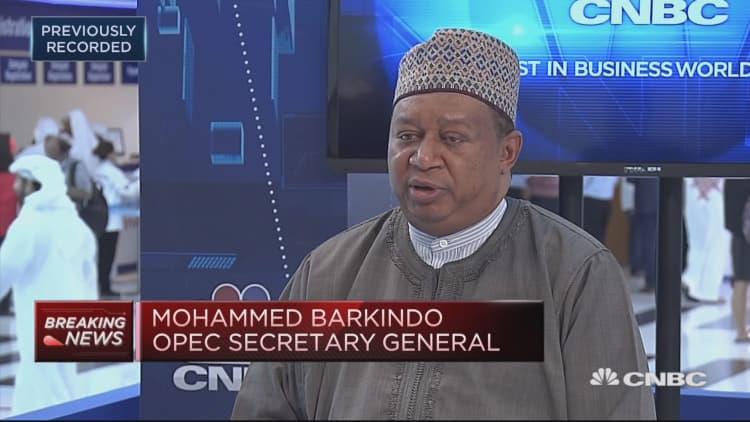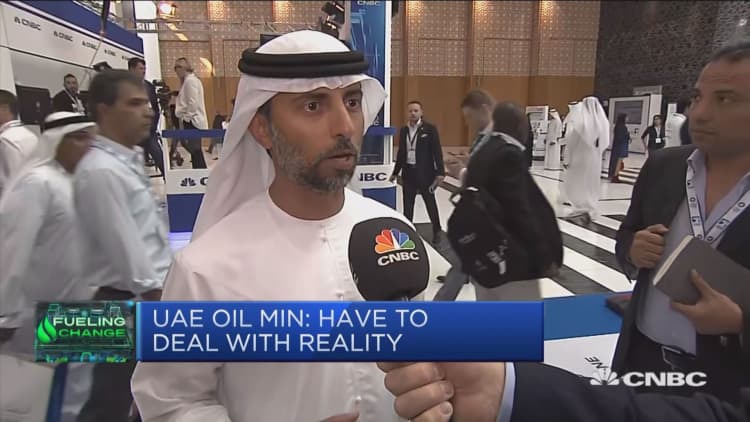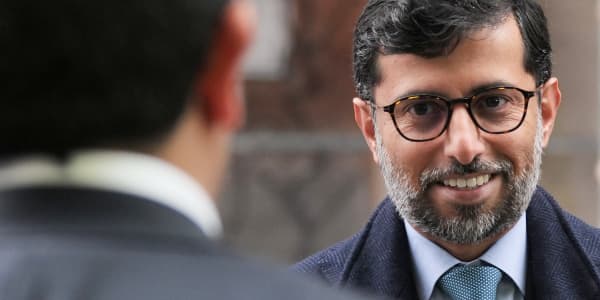
OPEC's secretary general told CNBC that oil price volatility is due to anxiety ahead of the 14-member oil producer group's next meeting in Vienna in December.
"What is happening at the moment, in our opinion, is the normal volatility that comes in the run up to our conferences. As you know, we reconvene in Vienna on the 6th and 7th of December … And this period between now and December is a period of anxiety for all stakeholders," Mohammed Barkindo told CNBC's "Squawk Box Europe" at the ADIPEC conference in Abu Dhabi Wednesday.
He said the organization of oil producers, whose defacto leader is Saudi Arabia, remained focused on stabilizing oil markets, which have seen supply and demand out of kilter for several years.
"We remain very focused on our principle objectives which we have made clear in the most transparent manner you can think of," he said.
"We remain focused jointly with our markets to restore stability to this market and we have registered some modest, I may say, achievements in that regard."
Oil prices slumped to their lowest level in more than eight months early on Wednesday, extending losses from a 7 percent plunge in the previous session. However, following the comments from oil market leaders, prices rallied. International benchmark Brent crude traded at around $66.45 at 9:30 a.m. London time, up almost 1.5 percent, while U.S. West Texas Intermediate (WTI) stood at $56.21, up almost 1 percent.
The recent falls had come amid heightened fears of a slowdown in global demand, with OPEC downwardly revising its projections for 2019. The influential oil cartel now expects demand to grow by around 1.29 million barrels per day (bpd) next year, approximately 70,000 bpd lower than last month's forecast.
The Middle East-dominated group has made increasingly frequent public statements in recent weeks, saying it is prepared to do "whatever it takes" to tighten supply and prop up prices. OPEC and non-OPEC producers led by Russia reached a landmark deal in late 2016 to cut production by a joint 1.8 million barrels per day in order to support prices.
In June 2018, they relaxed that strategy but with oil prices now falling again, Saudi Arabia has signaled it could once again curb output by as much as 500,000 barrels per day in December. Whether Russia wants to follow suit is a matter of speculation.
Speaking on Wednesday, Russian Energy Minister Alexander Novak said no decision on changing the country's oil output had yet been taken, saying market uncertainty should be studied, Reuters reported.
He also cautioned against market participants reacting to "any one-off fluctuations" in oil prices. Russia has been cutting oil production in November by 20,000 barrels per day from October levels so far, he said.
'Heightened anxiety'
That has put OPEC on another collision course with President Donald Trump, who publicly supports lower fuel prices and has urged OPEC not to cut production.
Asked about whether OPEC would follow Trump's "advice" not to cut production, Barkindo said OPEC is focused on "market fundamentals" and justified a possible tightening in output again.
"Thanks to the decision we took in June to reverse course after 18 months of implementing the supply adjustments that withdrew an average 1.8 million barrels per day, we saw that the market was on course to reach the red line," he said.
"And we, on our own (in June), consciously, pro-actively, reversed course and thanks to that decision the market remains relatively balanced in the fourth quarter," he said.
"But we are looking beyond that, we are looking into 2019 and OPEC, the IEA (International Energy Agency) and EIA (the U.S. Energy Information Administration) — most of the reputable institutions, have all projected a possible oversupply."

Alluding to the re-imposition of U.S. sanctions on OPEC oil producer Iran in early November, which dented market sentiment over the summer, Barkindo said price volatility was driven by "the heightened anxiety, the heightened uncertainties in the market, being introduced from outside the parameters of the oil markets — the geopolitics of the time, the uncertainties that are being driven by these geopolitics by decisions taken outside the industry itself but impacting us."
Meanwhile, the United Arab Emirates' Oil Minister (and OPEC President) Suhail Al Mazrouei, told CNBC that OPEC isn't a political organization but had to deal with reality.
"If the reality of the market is saying that one kind of crude (volume) is going to be increased then we have to take that into consideration and these things will change. They are not changing just because of sanctions, we are living in a very (fast) moving environment and those fundamentals are going to change," he told CNBC's Steve Sedgwick.
"Sometimes fundamentals play a key role (in determining price) and sometimes those geopolitics and sanctions and market sentiment plays that role. We need to not jump the gun or overreact and we will do whatever is necessary. We have three weeks until our next meeting and we will do the right thing."






